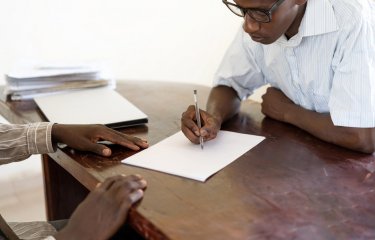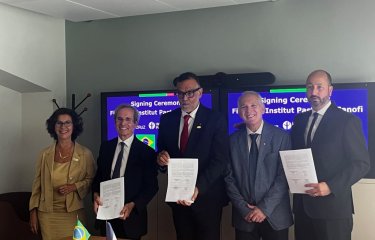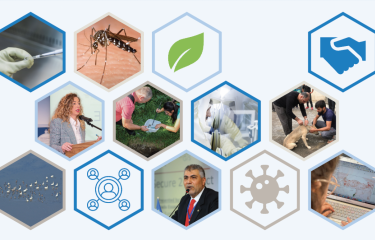Since the beginning of the COVID-19 pandemic, and increasingly rapidly thereafter, the Institut Pasteur International Network has drawn heavily on all its expertise and resources to tackle this emerging virus and its consequences, particularly through its support of institutes based in low-income countries. All Network member institutes have been identified by their health authorities as reference laboratories for COVID-19 diagnosis, putting them on the front line of the response to the outbreak. This case study from the Central African Republic focuses on the support provided by the Institut Pasteur to the Institut Pasteur de Bangui through emergency funding from the French Development Agency (AFD).
The Institut Pasteur de Bangui plays a key role in the Central African Republic as a consultative institution for the Ministry of Health. In recent years, faced with an increasing volume of work, its technical platforms have been adapted and modernized, with a level 3+ biosafety laboratory set up to diagnose the most virulent viruses. The Institut Pasteur de Bangui has therefore naturally taken on a key role in managing the COVID-19 outbreak in this country.
Guy Vernet and Emmanuel Rivalyn Nakouné Yandoko, respectively President and Scientific Director of the Institut Pasteur de Bangui, answer three questions on the Institut Pasteur de Bangui’s role and missions in response to this situation.
What have been the Institut Pasteur de Bangui's missions in relation to managing the SARS-CoV-2 outbreak?
Guy Vernet and Emmanuel Rivalyn Nakouné Yandoko: As a National Reference Laboratory accredited by the WHO for diagnosing influenza and other respiratory diseases, the Institut Pasteur de Bangui performs several missions in relation to managing the COVID-19 outbreak.
We advise the health authorities and perform community-based monitoring, a task assigned to us by the Ministry of Health. We also play a key coordinating role, having trained laboratory technicians in the six main inland cities so that diagnosis may be performed on a decentralized level. Thus, samples taken in healthcare facilities solely from symptomatic patients are sent to us for PCR tests. We gather data from the various laboratories and submit them to the Ministry of Health to ensure it is kept informed of the state of the outbreak at national level.
We also train and raise awareness of COVID-19 among the public and healthcare professionals (clinical presentation, diagnosis, epidemiology, etc.). Since August 2020, we have been providing negative test certificates enabling international travel. People who wish to travel come to the institute and we perform the tests.
Finally, we perform research on virus penetration in the population through antibody detection. We carry out passive observations on our patients who come to us for tests and have initiated 3 protocols on contacts, healthcare workers, and an epidemiological investigation in the districts of Bangui to estimate the proportion of people who have developed antibodies. Our core data suggest that 25% of the population have been infected with the virus and developed antibodies.
How have you organized diagnostic testing? What is the procedure for this in your laboratory?
Guy Vernet and Emmanuel Rivalyn Nakouné Yandoko: Initially, only the influenza laboratory team consisting of 12 people worked on the outbreak. At the peak of the crisis, the team was increased to 25 people by requisitioning technicians from the institute's various laboratories.
In practical terms, the strategy has evolved over the course of the outbreak. Initially, everything was centralized within the Ministry of Health and a monitoring committee was set up consisting of a rapid response team deployed in the field. Any suspected cases had to be reported to a toll-free number at the ministry. The response team then went out to take a sample, which was sent to the Institut Pasteur de Bangui laboratory for testing. The quantity of reagents and the laboratory's capacity quickly proved limited, prompting the country to change strategies several times. The Ministry of Health therefore decided to focus monitoring solely on symptomatic cases.
Thanks to the Institut Pasteur International Network, the Institut Pasteur (Paris) was able to quickly send us reagents enabling us to monitor the virus from the beginning of the outbreak. Using financial support from institutional funding bodies including the French Development Agency (AFD), we were also able to acquire sufficient quantities of reagents, consumables, and personal protective equipment (PPE) through the Institut Pasteur. We were also able to resolve the most urgent biosafety issues and increase our human resources through overtime for teams performing diagnostics. Moreover, we will also be in a position to invest in infrastructure, equipment, and audits of our premises and capacities. This will be a kind of upgrade enabling improved monitoring, preparation, and response to future emergencies.
Subsequently, we trained healthcare workers in health centers and hospitals to carry out monitoring and sampling prior to samples being sent to the laboratory.
At present, the Institut Pasteur de Bangui is mainly involved in sampling and diagnosing COVID-19 on-site, mostly for individuals planning on traveling, which accounts for approximately 250 people per day. As part of its epidemiological monitoring, the Institute receives approximately fifty samples taken off-site. At the peak of the outbreak, approximately 600 diagnoses were performed.
We also maintain a database containing all data collected on COVID-19, which enables us to regularly present analyses of results to various committees, which is essential for determining the type of monitoring and strategies to put in place.
What is your initial assessment of managing the outbreak?
Guy Vernet and Emmanuel Rivalyn Nakouné Yandoko: To date, the management of this crisis has been very positive for the Institut Pasteur de Bangui as it has boosted our image as a laboratory at the heart of the Central African Republic health system, with a very close relationship with the Ministry of Health. The steps we have been able to take due to our experience and resources have been very useful in managing the outbreak despite the difficulties encountered. The fact that we belong to various networks, firstly the national Ministry of Health and secondly the Institut Pasteur International Network, has enabled us to fulfill the role and missions assigned to us.
The institute has also been heavily involved in training technicians from the National Laboratory (the second laboratory to perform tests in the CAR), thus introducing unprecedented synergy and collaboration between the two institutions.
Finally, all the work set up and carried out by the Institut Pasteur de Bangui was made possible by the support and generosity of donors and funders including the Institut Pasteur in Paris, the AFD and UNICEF, among others
This study is part of the priority scientific area Emerging infectious diseases of the Institut Pasteur's strategic plan for 2019-2023.





